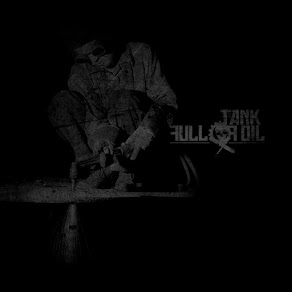Ministry
Until Nine Inch Nails crossed over to the mainstream, Ministry did more than any other band to popularize industrial dance music, injecting large doses of punky, over-the-top aggression and roaring heavy metal guitar riffs that helped their music find favor with metal and alternative audiences outside of industrial’s cult fan base.
That’s not to say Ministry had a commercial or generally accessible sound: they were unremittingly intense, abrasive, pounding, and repetitive, and not always guitar-oriented (samples, synthesizers, and tape effects were a primary focus just as often as guitars and distorted vocals). However, both live and in the studio, they achieved a huge, crushing sound that put most of their contemporaries in aggressive musical genres to shame; plus, founder and frontman Al Jourgensen gave the group a greater aura of style and theater than other industrial bands, who seemed rather faceless when compared with Jourgensen’s leather-clad cowboy/biker look and the edgy shock tactics of such videos as “N.W.O.” and “Just One Fix.” After 1992’s Psalm 69, which represented the peak of their popularity, Ministry’s recorded output dwindled, partially because of myriad side projects and partially due to heroin abuse within the band, but the band continued to resurface through the rest of the decade.

Ministry was formed in 1981 by Alain Jourgensen (born October 8, 1958, Havana, Cuba); he had moved to the U.S. with his mother while very young and lived in a succession of cities, eventually working as a radio DJ and joining a new wave band called Special Affect (fronted by future My Life with the Thrill Kill Kult leader Frankie Nardiello, aka Groovie Mann). Featuring drummer Stephen George, Ministry debuted with the Wax Trax! single "Cold Life," which -- typical of their early output -- was more in the synth pop/dance style of new wavers like the Human League or Thompson Twins. The album With Sympathy appeared on the major label Arista in 1983 and followed a similar musical direction, one that Jourgensen was dissatisfied with; he returned to Wax Trax! and recorded several singles while rethinking the band's style and forming his notorious side project the Revolting Cocks.

In 1985, with Jourgensen the only official member of Ministry, the Adrian Sherwood-produced Twitch was released by Sire Records; while not as aggressive as the group’s later, more popular material, it found Jourgensen taking definite steps in that direction. Following a 1987 single with Skinny Puppy’s Kevin Ogilvie (aka Nivek Ogre) as PTP, Jourgensen once again revamped Ministry, with former Blackouts bassist Paul Barker officially joining the lineup to complement Jourgensen’s rediscovery of the guitar; fellow ex-Blackouts William Rieflinike Scaccia (guitar), as well as vocalist Chris Connelly, were heavily showcased as collaborators for the first of several times on 1988’s The Land of Rape and Honey.

With Jourgensen and Barker credited as Hypo Luxa and Hermes Pan, respectively, this album proved to be Ministry’s stylistic breakthrough, a taut, explosive fusion of heavy metal, industrial dance beats and samples, and punk aggression. Released in 1989, The Mind Is a Terrible Thing to Taste built on its predecessor’s artistic success, and In Case You Didn’t Feel Like Showing Up was recorded on its supporting tour, introducing other frequent Ministry contributors like drummer Martin Atkins (later of Pigface) and guitarist William Tucker (as well as featuring a guest shot from Jello Biafra). Jourgensen next embarked on a flurry of side projects, including the aforementioned Revolting Cocks (with Barker, Barker’s brother Roland, Front 242 members Luc Van Acker and Richard 23, and many more), 1000 Homo DJs (with Biafra, Rieflin, and Trent Reznor), Acid Horse, Pailhead (with Ian MacKaye), and Lard (again with Biafra, Paul Barker, Rieflin, and drummer Jeff Ward).
That’s not to say Ministry had a commercial or generally accessible sound: they were unremittingly intense, abrasive, pounding, and repetitive, and not always guitar-oriented (samples, synthesizers, and tape effects were a primary focus just as often as guitars and distorted vocals). However, both live and in the studio, they achieved a huge, crushing sound that put most of their contemporaries in aggressive musical genres to shame; plus, founder and frontman Al Jourgensen gave the group a greater aura of style and theater than other industrial bands, who seemed rather faceless when compared with Jourgensen’s leather-clad cowboy/biker look and the edgy shock tactics of such videos as “N.W.O.” and “Just One Fix.” After 1992’s Psalm 69, which represented the peak of their popularity, Ministry’s recorded output dwindled, partially because of myriad side projects and partially due to heroin abuse within the band, but the band continued to resurface through the rest of the decade.

Ministry was formed in 1981 by Alain Jourgensen (born October 8, 1958, Havana, Cuba); he had moved to the U.S. with his mother while very young and lived in a succession of cities, eventually working as a radio DJ and joining a new wave band called Special Affect (fronted by future My Life with the Thrill Kill Kult leader Frankie Nardiello, aka Groovie Mann). Featuring drummer Stephen George, Ministry debuted with the Wax Trax! single "Cold Life," which -- typical of their early output -- was more in the synth pop/dance style of new wavers like the Human League or Thompson Twins. The album With Sympathy appeared on the major label Arista in 1983 and followed a similar musical direction, one that Jourgensen was dissatisfied with; he returned to Wax Trax! and recorded several singles while rethinking the band's style and forming his notorious side project the Revolting Cocks.

In 1985, with Jourgensen the only official member of Ministry, the Adrian Sherwood-produced Twitch was released by Sire Records; while not as aggressive as the group’s later, more popular material, it found Jourgensen taking definite steps in that direction. Following a 1987 single with Skinny Puppy’s Kevin Ogilvie (aka Nivek Ogre) as PTP, Jourgensen once again revamped Ministry, with former Blackouts bassist Paul Barker officially joining the lineup to complement Jourgensen’s rediscovery of the guitar; fellow ex-Blackouts William Rieflinike Scaccia (guitar), as well as vocalist Chris Connelly, were heavily showcased as collaborators for the first of several times on 1988’s The Land of Rape and Honey.

With Jourgensen and Barker credited as Hypo Luxa and Hermes Pan, respectively, this album proved to be Ministry’s stylistic breakthrough, a taut, explosive fusion of heavy metal, industrial dance beats and samples, and punk aggression. Released in 1989, The Mind Is a Terrible Thing to Taste built on its predecessor’s artistic success, and In Case You Didn’t Feel Like Showing Up was recorded on its supporting tour, introducing other frequent Ministry contributors like drummer Martin Atkins (later of Pigface) and guitarist William Tucker (as well as featuring a guest shot from Jello Biafra). Jourgensen next embarked on a flurry of side projects, including the aforementioned Revolting Cocks (with Barker, Barker’s brother Roland, Front 242 members Luc Van Acker and Richard 23, and many more), 1000 Homo DJs (with Biafra, Rieflin, and Trent Reznor), Acid Horse, Pailhead (with Ian MacKaye), and Lard (again with Biafra, Paul Barker, Rieflin, and drummer Jeff Ward).

In late 1991, Ministry issued the single "Jesus Built My Hotrod," a driving rocker featuring manic nonsense vocals by co-writer Gibby Haynes of the Butthole Surfers; its exposure on MTV helped build anticipation for the following year's full-length Psalm 69 (subtitled The Way to Succeed & the Way to Suck Eggs, although the only title that appears on the album consists of a few Greek letters and symbols). The record reached the Top 30 and went platinum, producing two further MTV hits with "N.W.O." and "Just One Fix," and Ministry consolidated its following with a spot on the inaugural Lollapalooza tour that summer (joined by new guitarist Louis Svitek). However, drug and legal problems sidelined the band in the wake of its newfound popularity, resulting in the clouded Filth Pig being released in 1995, too late to capitalize on their prior success. More problems with drugs and arrests followed, and Jourgensen returned to some of his side projects, recording a new album with Lard, among others. In 1999, the new single "Bad Blood" was featured prominently in the sci-fi special-effects blockbuster film The Matrix, setting the stage for the release of Dark Side of the Spoon (the title a reference to the band's heroin problems) later that summer. Guitarist William Tucker committed suicide in May 1999.

Ministry were nominated for a Grammy in 2000 for “Bad Blood,” but they lost to Black Sabbath and were dropped from Warner Bros. around the same time. They were also added to the Ozzfest tour, but they were kicked off before it even began because of a management change. To compound their sorrows, Ipecac Records announced three live albums to be released with material from the Psalm 69 tour being the main focus, but they only had a verbal agreement and when Warner Bros. caught wind of the project, they stamped it out despite already having the CDs ready for printing. In 2001, Ministry filmed a scene for Steven Spielberg’s A.I. and released their contribution to the film on a greatest-hits album, appropriately titled Greatest Fits. The song received a decent amount of promotion, but the single went nowhere and the band signed to Sanctuary Records later in the year. While recording new material, they released the Sphinctour album and DVD in the spring of 2002 to satisfy rabid fans who were disappointed by the Ipecac situation. The next spring Animositisomina was released, advertised as a return to the Psalm 69 style of songwriting and featuring a cover of Magazine’s “The Light Pours Out of Me.” Houses of the Molé followed in June 2004.

In September 2005 Ministry celebrated their 25th anniversary with Rantology. Jourgensen remixed such past hits as “Jesus Built My Hotrod” and “N.W.O. for the set; it also included live material, rarities, and the new track “Great Satan.” An extensive tour with Revolting Cocks in tow followed. The band then released Rio Grande Blood in May 2006, the second installment in what Jourgensen promised to be a George W. Bush-hating trilogy (which began with Houses of the Molé); the album earned Ministry another Grammy nomination (Best Metal Performance) for “Lies, Lies, Lies.” In 2007 the bandmembers announced they would be releasing their “final” album, The Last Sucker, by the end of the year. The 2008 compilation Cover Up examined Ministry’s long history of destroying other artists’ tunes.
[Web links]
Ministry@official
Ministry@official
Ministry@wiki
Ministry@myspace
Ministry@last.FM
[Video]
Ministry - No W (music video)
Ministry - Lieslieslies
Ministry - Psalm 69
Ministry - Filth Pig
Ministry - Revenge
Ministry - Lets Go
Ministry - Stigmata Live
Ministry - No W (Live)
Ministry - Just One Fix (Live Wacken Festival 2006)
[Discography]
Ministry@official
Ministry@wiki
Ministry@myspace
Ministry@last.FM
[Video]
Ministry - No W (music video)
Ministry - Lieslieslies
Ministry - Psalm 69
Ministry - Filth Pig
Ministry - Revenge
Ministry - Lets Go
Ministry - Stigmata Live
Ministry - No W (Live)
Ministry - Just One Fix (Live Wacken Festival 2006)
[Discography]
source:






















Post a Comment